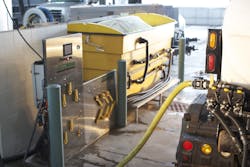Peters Township, Pa., executes successful anti-icing effort
Saving costs, reducing labor and effectively anti-icing winter roadways were top concerns for Peters Township, Pa., when the municipality began considering an in-house brine maker for pre-treating roads and pre-wetting salt.
“We read a lot about brine and the long-term, successful results in many Midwestern states like Iowa and Illinois for quite a while now,” said Peter Overcashier, public works director for the township.
After experimenting with agricultural products and other anti-icing and pre-wetting treatments, the township sought a more cost-effective option and selected an AccuBrine automated brine maker from Cargill Deicing Technology.
The brine-making system allowed the township to produce approximately 5,000 gal of brine per hour right at their facility and then house it in nearby storage tanks. Using a fully automated process, the system produces brine with accurate salinity concentrations all at the touch of a button.
“It proved to be a user-friendly system,” said Overcashier after testing the equipment.
At the onset of winter a severe ice storm struck the region, glazing roadways with a perilously frozen coating. Fortunately, the township was able to pre-treat major roads, streets and bridges approximately seven to eight hours in advance of the storm.
“I really didn’t think the brine would work so well in a freezing rain event,” Overcashier said. “I thought it would just wash off of the road, but it didn’t. We noticed a great difference between the streets that were treated with brine and the ones that were not treated. The untreated roads were like walking on glass.”
This successful outcome from anti-icing, and many others that followed throughout the winter, allowed the township to save on time and labor while maintaining safer driving conditions.
“The application crew really bought in to using the brine, and the system worked exactly like it was supposed to,” Overcashier said. “This first season was a learning curve since we had never used brine before, but most of the glitches came from us.”
Following the successful inaugural season using the brine maker, the township plans to outfit additional trucks with pre-wetting equipment, increase the use of brine for pre-wetting, expand anti-icing treatments beyond their priority routes and track numbers to determine a reduction in salt tonnage.
“Making brine definitely met my expectations for simple use and effective anti-icing,” said Overcashier. “And once we start tracking the numbers for next season, I’m convinced we’ll reduce our salt usage. I have no doubts about that at all.”
